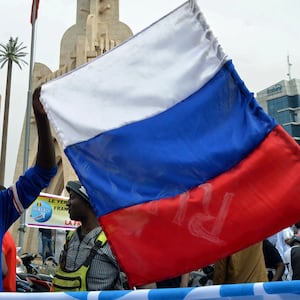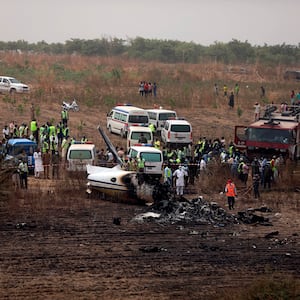ABUJA, Nigeria—Witnesses to the shocking public kidnapping of Nigerian and British national Nnamdi Kanu—head of the Indigenous People of Biafra (IPOB) group—told The Daily Beast that the separatist leader was stepping out of his car at an airport when a group of heavily armed men forcefully seized him to arrange his transfer to Nigeria.
In June, Kanu—who faces multiple charges in Nigeria, including treason—had driven into the underground parking lot at Jomo Kenyatta Airport in Kenya’s capital city of Nairobi. He had barely exited his two-door Audi TT when seven gun-wielding men rushed him and dragged him to their waiting vehicle, according to an airport staffer who witnessed the incident.
“Their aim was to capture him,” the airport staff told The Daily Beast. “They didn’t ask him any questions. They just grabbed him.”
As Kanu screamed for help, a number of people who were at the parking lot walked up to the scene and asked the armed men why they were taking the Nigerian, bystanders said. The men then allegedly responded by saying Kanu was a terrorist working for the Somalian jihadist group, al-Shabaab, after which they forced him into their vehicle and drove away.
“They didn’t all look Kenyan, and those that spoke didn’t have Kenyan accents,” an airport staffer, who didn’t want their identity revealed as they are not authorized to speak on the matter, said. “I’m not entirely convinced they were from any of Kenya’s security agencies.”
Part of this account of the incident corroborates the description given by Kanu’s special counsel, Aloy Ejimakor, on how his client was arrested. Ejimakor, who heard directly from Kanu on how he was seized in Nairobi, had told the BBC that his client was “grabbed” in “a very physical and rough way” at Jomo Kenyatta Airport by a group of “well-armed” men. According to Ejimakor, the men drove him to a private residence, where he was “chained to the floor” and “tortured” for eight days, before being blindfolded and flown to Nigeria’s capital of Abuja in a private jet on June 27, without having to pass through Kenyan passport control.
“The people that abducted him said that they were told by their sponsors that Kanu was a Nigerian terrorist linked to the Islamic terrorists in Kenya, presumably al-Shabaab,” Ejimakor told Premium Times, a Nigerian newspaper. “But after several days when they discovered his true identity, they tended to treat him less badly. Despite that, they told him they felt committed to hand him over to those that hired them.”
The Nigerian government has refused to provide details on how Kanu was apprehended. When Attorney General Abubakar Malami first announced his arrest and detention on June 29, he said the separatist leader was “intercepted through the collaborative efforts of the Nigerian intelligence and security services,” while Information Minister Lai Mohammed told reporters days later that Kanu’s capture “was made possible by the diligent efforts of our security and intelligence agencies, in collaboration with countries with which we have obligations.”
The silence by the authorities in Nigeria as to how Kanu—who’s also a British citizen—was arrested seems to give weight to speculation that the armed men who seized him in Nairobi were mercenaries hired by the Nigerian government, more so as the Kenyan government has denied it was involved in Kanu’s arrest and extradition. Britain has even had to wade in by asking the West African nation to explain how the IPOB leader arrived in detention.
“If due process was followed in the arrest and extradition of Kanu, the Kenyan government would have been happy to announce it,” a senior Nigerian military official told The Daily Beast privately. “There’s something fishy about this.”
Indeed, Kenya has never shied away from revealing details about deportations. The March 5 deportation of Isaac Sturgeon—an American national who fled to Kenya after participating in the Jan. 6 insurrection at the U.S. Capitol—was quickly confirmed by Kenyan authorities after the country’s immigration and police were informed he was in Nairobi. Sturgeon, who is accused of picking up a metal barricade at the Capitol and using it to shove back police officers who were guarding the building, was immediately arrested by the FBI on arrival at John F. Kennedy International Airport in New York City the following day.
“As for Kanu, it just looks like this was a job done by mercenaries [hired by the Nigerian government],” the military officer said. “That explains why the government is refusing to provide details of his arrest and extradition.”
In recent years, Kanu had become a thorn in the side of the government, using social media to advocate for Biafran independence and constantly taunting Buhari, who is from the predominantly Muslim northern region of Nigeria, whom he accuses of ethnic bias, especially towards the Igbo people who make up the southeast region.
In fact, it was in reaction to the agitations of pro-Biafran separatists that led Buhari to threaten to “deal with” people in the southeast in a social media post over a month ago, when he wrote that “many of those [referring to IPOB supporters] misbehaving today are too young to be aware of the destruction and loss of lives that occurred during the Nigerian Civil War. Those of us in the fields for 30 months, who went through the war, will treat them in the language they understand.”
The post, which Buhari shared on both his Facebook and Twitter accounts, was deleted by social media companies for violating their policies on abusive behavior. In reaction, the Nigerian government banned Twitter in the country over what Information Minister Lai Mohammed described as “the persistent use of the platform for activities that are capable of undermining Nigeria’s corporate existence.”
Mohammed later implied that Twitter’s lack of action against Kanu’s tweets contributed to the ban.
Kanu, who spent much of his adult life in the UK, was first arrested in Lagos in 2015 on an 11-count charge bordering on terrorism, managing an unlawful society, treason and illegal possession of firearms, among others. He was jailed for more than a year despite a number of court orders ruling for his release. The IPOB leader was eventually released on bail in 2017 but fled abroad, where he continued to advocate for the secession of Nigeria’s southeastern region. A prior secession attempt was made in 1967, under the name of the Republic of Biafra, triggering a three-year civil war in which nearly three million people died.
Biafra, which represented the nationalist aspirations of the Igbo ethnic group, was reunited with Nigeria after the war ended in 1970, but widespread outrage by the Igbos, who felt they were being marginalised by successive Nigerian governments, led to the creation of IPOB in 2014 with the sole aim of restoring the Republic of Biafra.
But while the government is bent on ensuring that Kanu, who’s spearheading the campaign for Biafran independence, is tried in court and convicted, his attorney believes he is a victim of an “abduction” and has no case to answer.
“Kanu’s trial is supposed to be opposed,” Ejimakor tweeted. “If any trial occurs, it’s those that renditioned him that will be on trial.”




